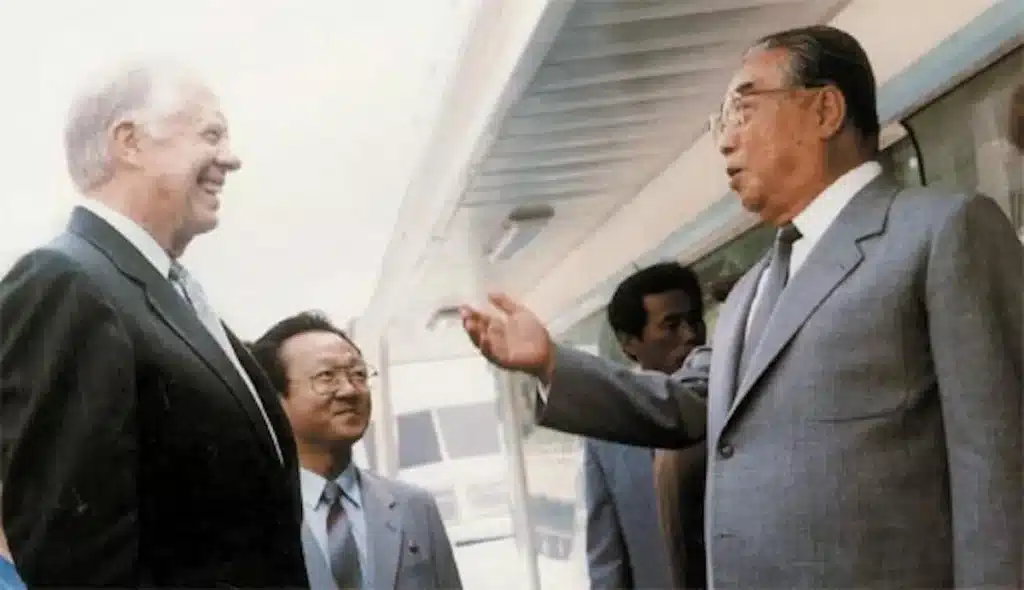Jimmy Carter’s Bold Move in North Korea

In June 1994, the world teetered on the brink of a nuclear crisis. Tensions between the United States and North Korea were at an all-time high. Amidst this precarious situation, former President Jimmy Carter made a historic visit to Pyongyang. This unprecedented trip marked the first time a former or sitting U.S. president had entered North Korea. Carter’s intervention is widely credited with averting a potential war that could have resulted in millions of casualties. As we reflect on this pivotal moment in history, we remember Carter’s legacy, especially following his passing at the age of 100 on December 29, 2021.
Rising Tensions and the Nuclear Threat
By early 1994, relations between Washington and Pyongyang had deteriorated significantly. U.S. intelligence agencies suspected that North Korea was secretly developing nuclear weapons, despite ongoing negotiations. The situation escalated when North Korea announced it would withdraw thousands of fuel rods from its Yongbyon nuclear reactor, a move that violated previous agreements requiring the presence of International Atomic Energy Agency (IAEA) inspectors. This announcement heightened American suspicions and led to the breakdown of negotiations.
In response, Washington began preparing for military action, including the possibility of airstrikes on Yongbyon. Such a move would likely have triggered a full-scale war on the Korean Peninsula, with devastating consequences for both North and South Korea. It was in this tense atmosphere that Carter decided to intervene. He had received personal invitations from Kim Il-sung, North Korea’s leader, and felt compelled to act. Carter believed that his visit could help de-escalate the situation and pave the way for a diplomatic resolution.
Carter’s Diplomatic Gamble
Carter’s visit to North Korea was not just a diplomatic maneuver; it was a personal gamble. He arrived in Pyongyang on June 15, 1994, accompanied by his wife, Rosalynn, and a small entourage. Meeting Kim Il-sung posed a moral dilemma for Carter, who had long despised the North Korean leader due to his role in the Korean War. However, upon meeting Kim, Carter found him to be surprisingly accommodating. Over several days, they engaged in discussions that included sightseeing tours and even a cruise on a luxury yacht owned by Kim’s son, Kim Jong-il.
During these meetings, Carter learned that North Korea was indeed preparing for a possible military confrontation. Kim’s advisers confirmed that they had been making plans for war in response to perceived U.S. aggression. This revelation underscored the urgency of Carter’s mission. He presented a list of demands from Washington, which included resuming negotiations and starting direct peace talks with South Korea. Remarkably, Kim agreed to all of Carter’s proposals, including a crucial deal to halt North Korea’s nuclear activities in exchange for U.S. assistance in building light-water reactors.
The Aftermath and Lasting Impact
Carter’s trip to North Korea had immediate and far-reaching consequences. Upon returning to the U.S., he faced backlash from officials who were unhappy with his “freelancing” approach to foreign policy. Despite this, Carter’s negotiations led to the Agreed Framework, a formal plan that froze North Korea’s nuclear program for nearly a decade. Although the agreement eventually broke down in 2003, it represented a significant diplomatic achievement at a time when war seemed imminent.
Carter’s bold actions opened the door for future diplomatic engagements between the U.S. and North Korea. His visit laid the groundwork for subsequent negotiations, including a historic summit between Donald Trump and Kim Jong Un in 2018. While the threat of nuclear conflict has not been eliminated, Carter’s intervention is remembered as a courageous effort to prevent war. His legacy is a testament to the power of diplomacy and the importance of personal conviction in international relations. As Robert Carlin, a former CIA official, noted, “Carter had guts.”
Observer Voice is the one stop site for National, International news, Sports, Editor’s Choice, Art/culture contents, Quotes and much more. We also cover historical contents. Historical contents includes World History, Indian History, and what happened today. The website also covers Entertainment across the India and World.

